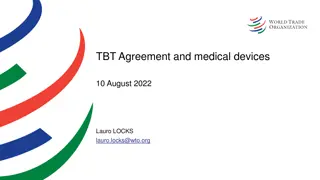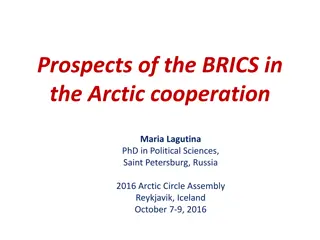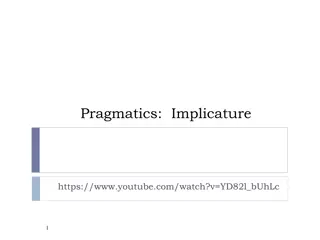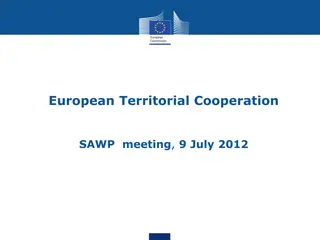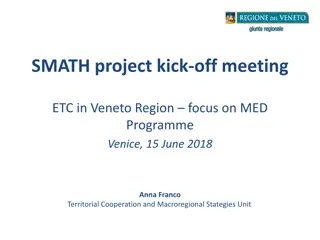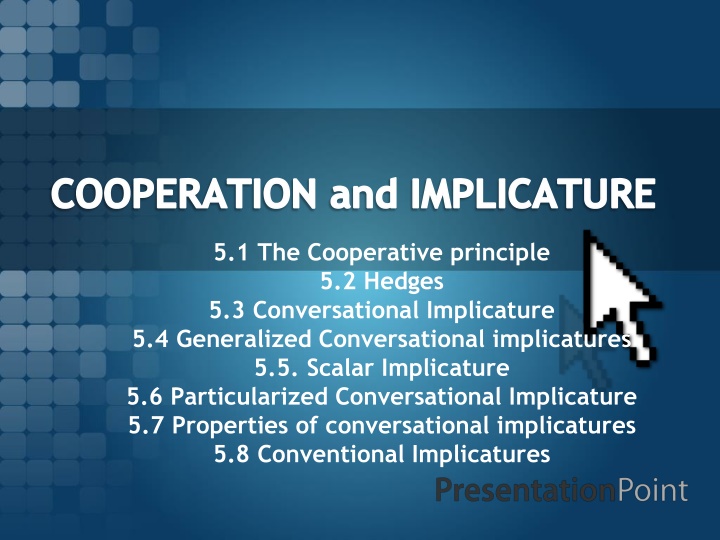
Cooperation and Implicature in Conversations
Explore the principles of cooperation and implicature in conversations, where speakers and listeners aim to communicate effectively by following established guidelines such as the Cooperative Principle. Learn about hedges, conversational implicatures, and different types of implicatures like scalar and generalized implicatures. Discover how speakers convey more than just literal meanings through conversational implicatures.
Download Presentation

Please find below an Image/Link to download the presentation.
The content on the website is provided AS IS for your information and personal use only. It may not be sold, licensed, or shared on other websites without obtaining consent from the author. If you encounter any issues during the download, it is possible that the publisher has removed the file from their server.
You are allowed to download the files provided on this website for personal or commercial use, subject to the condition that they are used lawfully. All files are the property of their respective owners.
The content on the website is provided AS IS for your information and personal use only. It may not be sold, licensed, or shared on other websites without obtaining consent from the author.
E N D
Presentation Transcript
COOPERATION and IMPLICATURE 5.1 The Cooperative principle 5.2 Hedges 5.3 Conversational Implicature 5.4 Generalized Conversational implicatures 5.5. Scalar Implicature 5.6 Particularized Conversational Implicature 5.7 Properties of conversational implicatures 5.8 Conventional Implicatures
Introduction When people talk: converse smoothly & successfully Conversation: no confusion, no trick, but withhold relevant information Cooperation: essential factor when speakers and listeners are . (listener s expectation to the speaker) Implicature: attained when a speaker intends to communicate more than just what the words mean. which s Speaker implicatures Listener recognizes those communicated meanings via inference Page 2
5.1 The Cooperative Principle (Grice, 1975): the idea that people cooperate with each other in conversing: principle cooperative principle: make your conversational contribution such as is , at the stage at which it occurs, by the accepted purpose or direction of the talk exchange in which you are engaged. four maxims under this general principle: 1. Quantity 2. Quality 3. 4. Manner Page 3
1. Maxim of (i) Make your contribution as informative as is required for the current purpose of exchange. (ii) Do not make your contribution more informative than is required. 2. Maxim of QUALITY: Try to make your contribution one that is true. (i) Do not say what you believe to be false. (ii) Do not say that for which you lack adequate evidence. 3. Maxim of : be relevant 4. Maxim of MANNER: (i) Avoid obscurity of expression. (ii) Avoid ambiguity. (iii) Be brief. (iv)Be orderly. : Page 4
e.g: Man Woman: No. (The man reaches down to pat the dog. The dog bites the man's hand.) Man : Quch! Hey! You said your dog doesn't bite Woman: He doesn't. But that's not my dog. : Does your dog bite? lunatic Asking the question, the man assumes that the dog belongs to the woman. The woman's answer provides less information than expected. The maxim of quantity is flouted. Is the woman willing to talk with the man? If your answer is No, you have rightly figured out the implicature. Page 5
5.2 Hedges Hedges: When making a statement certain expressions are used to indicate the degree of certainty concerning the information given. E.g . As far as I know, they are getting married. Hedging Hedging for maxim So, to cut a long story short, we grabbed our stuff and ran Not to change the subject, but is this related to the budget? Hedging for I m not sure if this makes sense, but the car had no lights. Hedging for maxim Page 6
5.3 Conversational Implicature Conversational implicature: that participants are adhering to the cooperative principle and the maxims. in conversation E.g: Wife Husband : Ah, I brought the bread. : I hope you brought the bread and the cheese. Analysis: In this case, the husband did not mention the cheese. He must intend that the wife infers what is not mentioned was not brought. The husband has conveyed more than he has said via a conversational implicature. Page 7
Using the symbol +> for an implicature, we can represent the additional conveyed meaning: Wife: b & c? Husband: b ( +> NOT c) 5.4 Generalized Conversational Implicatures a : possibility to perceive that there is no special background knowledge required in the context to calculate the additional conveyed meaning.
5.5 Scalar Implicature Scalar implicatures: occur when certain information is communicated by choosing a word which expresses one value from a scale of values. From the highest to the lowest : <all, most, many, some, few> <always, often, sometimes> E.g: I m studying linguistics and I ve completed some of the required courses. - some of the required courses the speaker creates an implicature (+> not all ) - In fact, the speaker creates the implicatures (+> not all, +> not most, +> not many). The basis of the scalar implicature is that when any form in a scale is asserted, the negative of all forms higher on the scale is implicated.
5.6 Particularized Conversational Implicature Particularized conversational implicatures: occur when a conversation takes place in a very specific context in which locally recognized inferences are assumed. e.g Rick: Hey, coming to the wild party tonight? Tom: My parents are visiting. In order to make Tom s response relevant, Rick has to draw on some assumed knowledge that one college student in this setting expects another to have. Tom will be spending that evening with his parents, and time spent with parents is quiet ( consequently +> Tom not at party).
E.g Bert: Do vegetarians eat hamburger? Ernie: Do chickens have lips? In the above example, Ernie s response does not provide a yes or no answer. Bert must assume that Ernie s response means of course not! Page 11
5.7 Properties of Conversational Implicatures Properties of implicatures taken into consideration are part of what is communicated and not said. : All the Speakers can always deny that they intended to communicate such meanings. Conversational implicatures are They can be explicitly denied (or alternatively, reinforced) in different ways. The example below can illustrate this idea: You have won only five dollars! (+> ONLY five)
It is quite easy for a speaker: 1. to expression at least E.g You ve won at least five dollars! the implicature (only) using the 2. To information, often following the expression in fact E.g You ve won five dollars, in fact, you ve won ten! the implicature by adding further 3. to information, as in: e.g You ve won five dollars, that s four more than one! the implicature with additional Page 13
We have already noted with many of the previous examples that implicatures can be calculated by the listeners via inference. In terms of their defining properties, then, conversational implicatures can be However, in conventional implicatures, these properties are NOT applied. Page 14
5.8 Conventional implicatures are NOT based on the cooperative principle or the maxims. They do not have to depend on special contexts for their interpretation. , and they do not Conventional implicatures are associated with specific words and result in additional conveyed meanings when those words are used. The English conjunction but is one of these words. BUT, YET, EVEN E.g Mary suggested black, but I chose white. Page 15
In this sentence, Mary suggested black is contrasted, via the conventional implicature of but , with my choosing white. Other English words such as yet also have conventional implicatures: Dennis isn t here yet. In uttering this statement, the speaker produces an implicature that she/he expects the statement Dennis is here . The is expected to be different, or perhaps the opposite, at a later time. of yet is that the present situation Page 16









